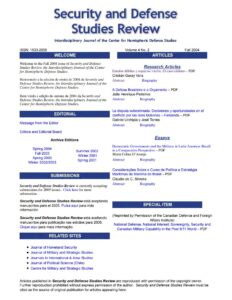Departing from a series of concepts referred to as "the bankruptcy of the States", a perspective taken from Frenchman Philippe Delmas (1992), the author confronts the concepts of lawless areas and empty spaces, stating that they obey two different models of States, that is, unsuccessful States and weak States. Examining the bibliography, Garay discusses the autonomy of the weak states/empty spaces relationship from the unsuccessful states/ lawless areas pair, then applies them to the analysis of Latin America. Under the author’s supposition, the austral zones of Chile and Argentina can be analyzed using the weak states/empty spaces concept rather than the concept of unsuccessful states/lawless areas. An empirical examination permits us to postulate that empty spaces are conflicted spaces for human presence, which weakens the presence of the state, and given that the resources of the aforementioned states are scarce, that which is produced is a presence that is weakened from the police system, but not by the absence of law, which is why it would not be pertinent to extend this typology to the Southern Cone, as is normally done when analyzing the Tri-Border area.

